'BJP's ultimate ambition is to control Bihar independently.'

"So far, Nitish Kumar was the BJP's barrier in Bihar, now that he is accommodated, the BJP can fill the Nitish vacuum with its own face.
"It will be a two-party fight in Bihar -- the BJP vs RJD," Dr Rajiv Kumar, who has just retired as head of the department of politics, Mahatma Gandhi Central University in Motihari, Bihar tells Rediff.com's Archana Masih.
What do you think compelled Nitish Kumar to return to the NDA fold? Was it because of pressure from the JD to make Tejashwi Yadav CM or for being sidelined in the INDIA alliance?
A politician takes decision on the basis of profit and loss.
In the run-up to the Lok Sabha elections as the INDIA alliance started taking shape last year, the political atmosphere indicated that the alliance could stop the BJP's advance if they were able to defeat the BJP in 100 seats.
But subsequently, the political atmosphere has changed and it emerged that the BJP seems invincible in 2024.
Why do you believe the BJP is invincible in 2024?
Because people have no substantial option. The 2% to 8% fluctuating vote will shift to the BJP even if they are not satisfied with the Modi government.
What was Nitish Kumar's calculation in joining the BJP?
He thought he would not benefit much by contesting the Lok Sabha election as part of the INDIA alliance if he was not the chairman of the alliance.
In 2019, the JD-U won 16 and the BJP won 17 out of the 40 Lok Sabha seats in Bihar.
The BJP's immediate interest is the Lok Sabha election and they do not want to reduce that tally at any cost in Bihar. Every seat counts. So, Nitish's return will also benefit the BJP because Nitish Kumar has maintained a 15% to 16% vote share in his favour -- and this vote percentage is extremely important for the BJP.
Nitish has also realised that he is at the latter stage of his political career and that he cannot be chief minister independently neither can he become a prime ministerial candidate nor get a leading role in the INDIA alliance.
The developments in political circles also indicate that the BJP initiated Nitish's switch with behind-the-door conversations.
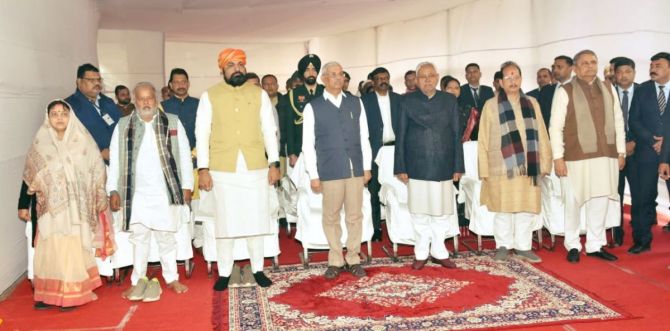
What gains are there for Nitish Kumar?
Perhaps he will get a berth in the central Cabinet or governorship in the future.
I believe that though the BJP will fight the Lok Sabha election with Nitish, they will not contest the Bihar Vidhan Sabha election under Nitish in 2025.
The voter behaviour is different when it comes to state elections. Therefore, after the Lok Sabha election, the BJP might move Nitish to the Centre and that is the reason why the BJP has installed two deputy chief ministers.
The BJP has indicated that the two deputy chief ministers are the options for CM after Nitish Kumar.
The BJP's ultimate ambition is to control Bihar independently.
Tejashwi Yadav has said the JD-U will be finished by 2024.
In the 2022 assembly election, there seemed to be a conflicting impression whether the mandate was in favour of the RJD or the BJP-JD-U alliance. But as far as the vote share is concerned the RJD got 23% vote and 75 seats. The mandate tilted towards Tejashwi and was anti-Nitish.
As far as the people's mandate is concerned it was in favour of the RJD. This public perception will be reflected in the next Vidhan Sabha election. This time around, the contest will be between Tejashwi and BJP.
As far as the common voters' perception is concerned -- whether they like or dislike the BJP -- they will prefer that the Modi government continues at the Centre.
They feel there is no other option at the Centre.
But as far as state elections are concerned, voters think differently. The young demography is dismantling caste considerations. The caste considerations are breaking down as far as youth ambitions are concerned.
For example, in UP, people believe that Yogi is a better chief minister. They prefer Yogi in UP and Modi at the Centre and see no conflict about that in their mind.

What challenge does this throw for Tejashwi Yadav and RJD?
Bihar has seen long years of the Lalu-Rabri chief ministership followed by 18 years of Nitish. The people of Bihar see Tejashwi as a young, communicative leader with grassroot connect.
He campaigned tirelessly in the assembly election and that's why the RJD won the largest number of seats with 23% vote share.
He will remain an active and crucial part of North Indian politics. Other than the RJD, only the BJP will be able to project a leader in the Vidhan Sabha election in Bihar.
Samrat Chaudhary and Prem Kumar [minister and 8 times MLA from Gaya] belong to the backward castes and represent the lower social groups. The BJP has started its preparation for the assembly election by bringing such leaders to the forefront.
Therefore, Nitish Kumar will not be a factor in the assembly election?
His vote bank will be transferred to either the RJD or BJP.
This friendship between the BJP-JD-U will last only till Lok Sabha election. People would like a new face or a new experiment. They have experienced Nitish for a very long time and will prefer the BJP or RJD.
People say the BJP has no face in Bihar, but they already have Samrat Chaudhury, Vijay Kumar Sinha and Prem Kumar. A CM from the backward caste will be more suitable considering the caste calculation in Bihar.

What do you see as the JD-U'S future? Will it merge with the BJP?
It might get dismantled or merge with other parties. It has happened with parties like the Janata Party, the Rashtriya Lok Samta Party etc.
Other senior JD-U leaders have also aged. The party may continue, but will not play a decisive role after Nitish Kumar.
The Kurmi vote, however, will remain with Nitish which will benefit the BJP even if they move him to the Centre or make him governor.
Meanwhile, the BJP can fill the Nitish vacuum in Bihar with its own face. So far, Nitish was the BJP's barrier in Bihar, once he is accommodated, the BJP can project its own face in Bihar.
It will be two-party fight in Bihar -- the BJP vs RJD.
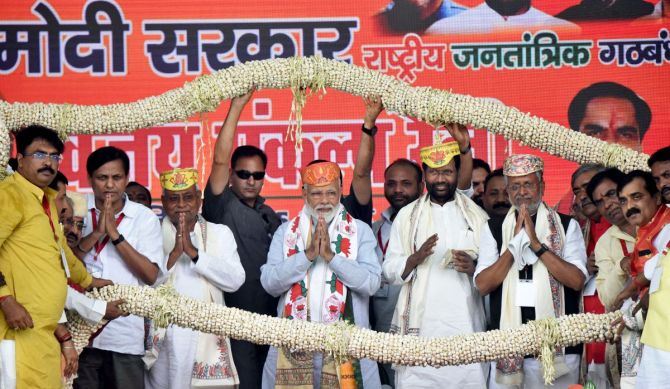
What do you see as the RJD's next move? What reaction is this going to draw?
The RJD will be a force in the assembly election, but it is a regional party and cannot threaten the BJP in the Lok Sabha. In the Vidhan Sabha, it will be a two-party fight in Bihar, but without Nitish Kumar.
Has Nitish's exit made any difference to the INDIA alliance?
It is not going to make any difference. The INDIA alliance is still emerging and has not taken concrete, permanent shape. Every party in the alliance is collating its own advantages and disadvantages. Their common enemy is the BJP, but except the Congress, they are all regional parties.
Individually, these parties may not pose a big challenge to the BJP in the Lok Sabha, but will be a formidable force in state elections.

Do you feel Rahul Gandhi and the Congress should not have embarked on the Bharat Jodo Nyay Yatra and concentrated on the seat sharing arrangement instead?
I do not think that the differences between the partners is weakening the alliance. The Congress is an old party with deep roots in India and its strategists would have calculated that this yatra will benefit the party.
The BJP got 37% to 38% vote in the Lok Sabha in the national perspective. The rest of the votes are divided amongst various regional parties.
In time to come, the anti-Modi vote is going get consolidated under the Congress. It will be a fight between the BJP and Congress at the Centre. Gradually, a two-party system is emerging in India and that is why Rahul is intelligently projecting it as a fight between ideologies.
It will be a fight between two ideologies. The Indian political system is moving towards a two-party system.
Most regional parties have one leader and most of these leaders are aging and exhausted.
Except Akhilesh Yadav and Tejaswi Yadav, there are no young regional party leaders in North India.
In the South, however, there are several young regional leaders. I think that the Congress is working on a long-time strategy where it hopes to be the single option against the BJP.
Feature Presentation: Aslam Hunani/Rediff.com
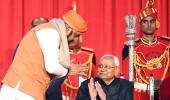


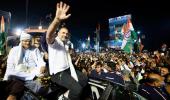





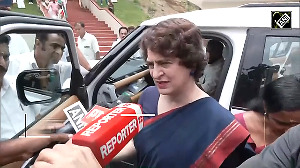

 © 2025
© 2025